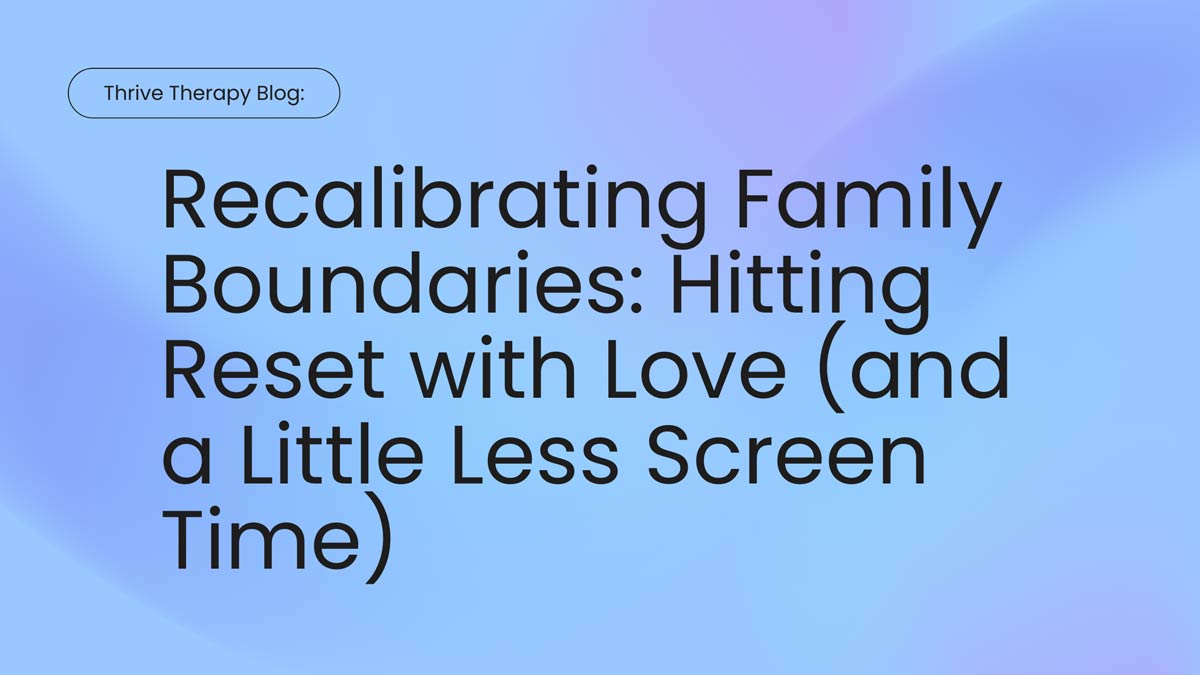Recalibrating Family Boundaries: Hitting Reset with Love (and a Little Less Screen Time)

The good news? It’s never too late to recalibrate. Families are incredibly resilient systems. A thoughtful reset—done with clarity, compassion, and consistency—can do wonders for everyone’s mental health. Let’s talk about how to do it, and why consequences like “no screen time” or “no sugar” might actually support emotional regulation and healthier family dynamics.
But when boundary-slipping becomes the norm, it sends mixed signals to our kids—and leaves us feeling reactive rather than grounded in our parenting. That’s when frustration builds, behavior escalates, and we feel like we’re constantly putting out fires. It’s something I often explore in CBT therapy sessions in San Diego, especially when families are working to get back on track.
Here’s a simple framework I often recommend to families in counseling in San Diego:
-
Reflect as adults first
What boundaries used to work for your family that have drifted? Where are the stress points now?
Be honest—with yourself and your parenting partner—before looping in the kids. -
Pick 1–2 clear boundary changes to start
Too many shifts at once can feel overwhelming. Choose one or two areas where the current boundaries
no longer serve your family. Common ones? Screen time and sugar. -
Communicate the “why” to your kids
Even young kids deserve to understand the reasoning behind new boundaries. Try something like:
“We’ve noticed we’re all feeling more tired and cranky lately. Too much screen time and sugar
can make it harder for our brains and bodies to feel good. So we’re making some changes so we can
all feel better.” -
Hold the line with warmth and consistency
Boundaries aren’t punishments—they’re structure. When kids test them (which they will), respond with empathy and firmness:
“I know it’s hard to stop watching. That’s why we’re practicing now. We’ll try again tomorrow.”
-
Screens: Too much screen time can dysregulate kids’ nervous systems, making it harder for them to focus, sleep, and manage emotions.
A break helps them recalibrate. -
Sugar: Excess sugar can create mood highs and lows that mimic anxiety and irritability.
A temporary reduction can stabilize energy and behavior, helping everyone reset emotionally.
When these are framed as supports rather than consequences, kids start to understand that boundaries help them feel better, not just “behave better.” This is something I often work on with families as a psychologist in San Diego, especially when emotional regulation is a concern.
Kids want structure, even if they protest. Boundaries tell them they are safe, that someone is in charge, and that their big feelings won’t scare you off. That’s regulation—and it’s the heart of healthy emotional development.
At our practice, we specialize in helping parents and children navigate co-regulation, emotional resilience, and everyday parenting challenges. If you’re ready to reset boundaries and build a more connected family life, reach out to schedule a consultation. We’re here to walk with you, one step (and one boundary) at a time.
Reach out to start
your healing journey

